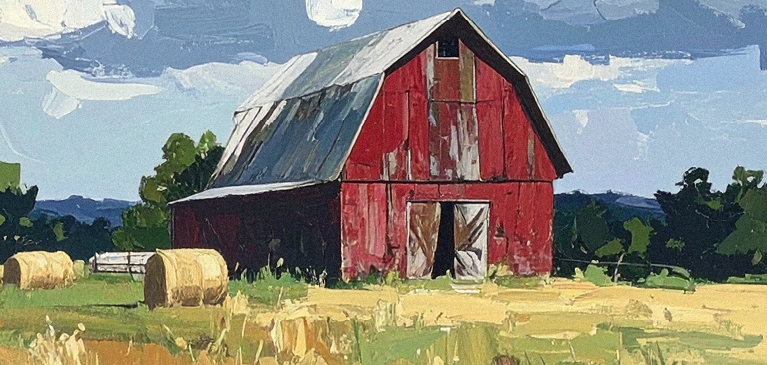
On July 4, 2025, the One Big Beautiful Bill (OBBB) Act was signed into law to extend, enhance and, in some cases, make permanent some of the Tax Cuts and Jobs Act’s (TCJA) tax law changes in addition to addressing a long list of other important and new agricultural issues (Text - H.R.1 - 119th Congress (2025-2026): One Big Beautiful Bill Act | Congress.gov | Library of Congress).
In this article, we highlight the provisions that are most relevant and applicable to our farming customers from an income taxation standpoint.
Individual Income Tax Rates
The OBBB permanently extends the tax rates and brackets enacted by the TCJA which will continue to save farmers income tax.
Standard Deduction
Beginning in 2025, the OBBB provides an increase in the Standard Deduction to $15,750 for singles, $23,625 for heads of household, and $31,500 for taxpayers married filing jointly. This increased standard deduction is also made permanent.
Personal Exemption
Under Internal Revenue Code (IRC) 151, taxpayers were historically allowed to claim a personal exemption deduction for themselves, their spouse, and qualifying dependents. For tax years prior to 2018, this deduction reduced taxable income by a set amount per eligible individual. The TCJA suspended the personal exemption through 2025. The OBBB repeals the personal exemption.
Child Tax Credit and Other Dependent Credit
The OBBB permanently creates a child tax credit of $2,200 (adjusted for inflation) (beginning in 2025) for qualifying children under 17. (Income phase-out thresholds - $200,000 for singles and $400,000 for married filing jointly). The OBBB also makes permanent the $1,700 refundable portion of the credit, adjusted for inflation.
The OBBB also makes permanent the $500 non-refundable credit for other dependents who do not qualify for the child tax credit, including those over the age of 16.
Estate and Gift Tax Exemption
The OBBB permanently increases the estate and gift tax exemption (basic exclusion or Unified Credit), beginning in 2026, to $15 million per person, indexed for inflation. In 2025 the exclusion remains $10 million per person.
Repayment Cap on Excess Advance Premium Tax Credit (PTC) Payments Eliminated
Under the OBBB, the repayment cap on excess advance PTC payments is eliminated – taxpayers will have to repay their excess advance PTC payments in their entirety. This is effective for 2025.
Extension and Enhancement of Deduction for Qualified Business Income
The 20% Qualified Business Income Deduction (QBID) for sole proprietors and pass-through businesses under I.R.C. § 199A is made permanent by the OBBB. This includes the I.R.C. § 199A(g) deduction for agricultural cooperatives and their patrons.
This new legislation includes a new minimum $400 deduction for taxpayers with at least $1,000 in “active” qualified business income. Both amounts will be adjusted annually for inflation.
Additional First Year (Bonus) Depreciation Changes
Bonus depreciation was reinstated to 100% and made permanent in the OBBB – be careful though as this is only for capital expenditures made after January 19, 2025. Purchases prior to January 19, 2025 are only eligible for a maximum of 40% bonus depreciation.
Section 179 Expense Enhancements
Section 179 expense was permanently increased to $2,500,000 and the phaseout threshold amount was increased to $4,000,000 for property placed in service year beginning after 2024 in the OBBB. These amounts will be indexed for inflation after 2025.
1099-MISC and 1099-NEC Requirements
The new law increases the payment threshold to $2,000 per payee to file 1099-MISC and 1099-NEC information returns, beginning with payments made in the 2026 tax year. The current threshold of $600 per payee remains in effect for the 2025 tax year. For years after December 31, 2025, this should reduce 1099 reporting compliance burden for some farmers.
Gain from the Sale or Exchange of Farmland Property to Qualified Farmers
The OBBB creates a new election for those selling farmland property to a qualified farmer (an individual who is actively engaged in farming). This election allows the seller to choose to pay their taxes on the gain in four equal installments. The election is available to individuals and other entities that have either farmed the property or leased it to a qualified farmer for 10 years prior to the sale.
The seller can only make the election if the land is subject to a covenant or other legally enforceable restriction which prohibits the use of the property other than as a farm for farming purposes for 10 years after the date of the sale or exchange. A copy of the covenant must be filed with the first tax return.
This provision is effective for sales or exchanges occurring after the enactment of the OBBB.
No Tax on Overtime
OBBB created a provision whereby individuals can deduct up to $12.5k (or $25k for married filing jointly) of overtime pay. This begins phasing out by $100 for every $1,000 over $150,000 Modified Adjusted Gross Income (MAGI) for individuals ($300,000 for married filing jointly).
Similar to the no tax on tips, this is effective January 1, 2025 – this provision expires after years ending December 31, 2028.
W-2 forms will likely be amended to include this necessary reporting to enable amounts to be reported correctly.
This likely will not be applicable for agricultural employers that do not pay overtime wages.
Termination of Cost Recovery for Energy Property
OBBB no longer allows taxpayers to use five-year classification on this property (which reduces the upfront tax benefits of clean energy programs).
This provision applies to property for which construction begins after December 31, 2024.
Conclusion: The OBBB introduces complexity alongside opportunity. Proactive planning can help you take full advantage of the new law.
To better understand how the OBBB may impact your financial tax strategies, reach out to your tax accountant or CPA to discuss in detail.
To view the rest of the 2025 fall Partners articles please click here.


